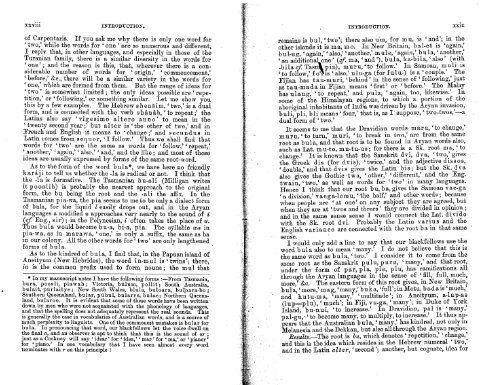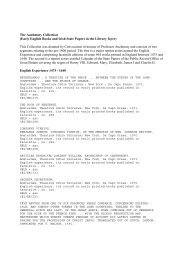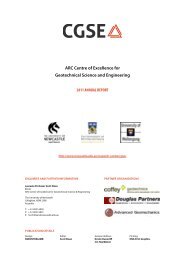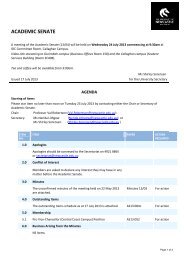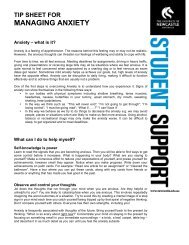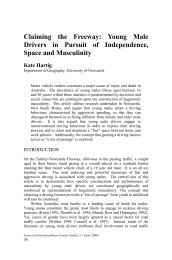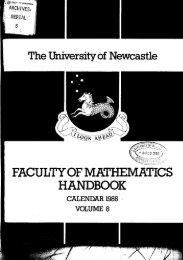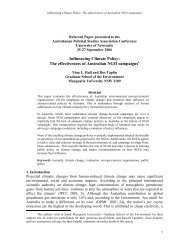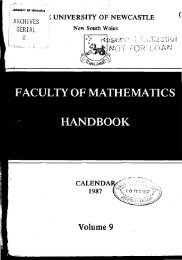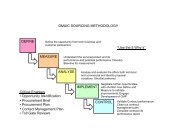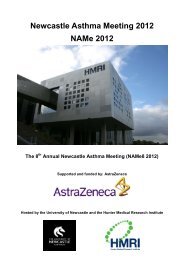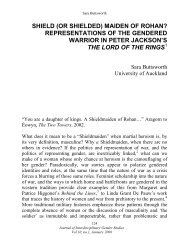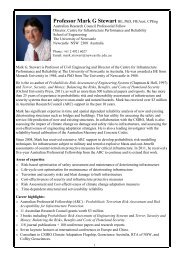n - University of Newcastle
n - University of Newcastle
n - University of Newcastle
You also want an ePaper? Increase the reach of your titles
YUMPU automatically turns print PDFs into web optimized ePapers that Google loves.
xxviii INTBODUCTIOS.<br />
<strong>of</strong> Carpentaria. If you ask me why there is only one word for<br />
' two,' while the words for ' one ' are so numerous and different,<br />
I reply that, in other languages, and especially in those <strong>of</strong> the<br />
Turanian family, there is a similar diversity in the words for<br />
'one' ; and the reason is this, that, wherever there is a considerable<br />
number <strong>of</strong> words for ' origin,' ' commencement,'<br />
'before,' kc., there will be a similar variety in the words for<br />
' one,' which are formed from them. But the range <strong>of</strong> ideas for<br />
' two ' is somewhat limited ; the only ideas possible are ' repetition,'<br />
or 'following,' or something similar. Let me show you<br />
this by a few examples. The Hebrew s henaim, 'two,' is a dual<br />
form, and is connected with the verb shbnlh, ' to repeat;' the<br />
Latins also say 'rigesimo altero annoy to mean in the<br />
' twenty second year;' but alter is 'the other <strong>of</strong> two,' and in<br />
French and English it means to . change ;' and s ecundus in<br />
Latin comes from sequ or, ' I follow.' Thns we shall find that<br />
mords for two' are the same as words for ' follow,' 'repeat,'<br />
' another,' ' again,' ' also,' ' and,' and the like ; and most <strong>of</strong> these<br />
ideas are usually expressed by forms <strong>of</strong> the same root-word.<br />
As to the form <strong>of</strong> the word bula*, we have here no friendly<br />
kariiji to tell us whether the -la is radical or not. I think that<br />
the -la is formative. The Tasmanian bu-ali (Milligan writes<br />
it pooali h) is probably the nearest approach to the original<br />
form, the bu being the root and the -ali the attix. In the<br />
Tasmanian pia-na, the pia seems to me to be only a dialect: form<br />
<strong>of</strong> bula, for the liquid I easily drops out, and in the Aryan<br />
languages a modified u approaches very nearly to the sound <strong>of</strong> i<br />
(c$ Eng., sir) ; in the Polynesian, i <strong>of</strong>ten takes the place <strong>of</strong> u.<br />
Thus bu la would become bu-a, bi-a, pia. The syllable ton in<br />
pia-w a, ns in mar awn, ' one,' is only a suffix, the same as ba<br />
in our colony. All the other mords for ' two' are only lengthened<br />
forms <strong>of</strong> bula.<br />
As to the kindred <strong>of</strong> bula, I find that, in the Papuanisland <strong>of</strong><br />
Aneityum (Xew Hebrides), the word in-mu1 is 'twins'; there,<br />
igz is the common prefix used to form nouns; the mu1 that<br />
* In my manuscript notes I have the following fornls :-From Tasmania,<br />
bura, pooali, piawah ; Victoria, balnm, pollit; South Australia,<br />
hulait, parlaitye ; New South Wales, blula, buloara, bu1;oara-bo ;<br />
Southern Queensland, bular, piibul, bularre, bulae; Northern Queensland,<br />
bularoo. It is evident that some <strong>of</strong> these words have been written<br />
down by inen who were not acquainted with the phonology <strong>of</strong> languages,<br />
and that the spelliilg does not adequately represent the real sounds. This<br />
is generally the case in vocabularies <strong>of</strong> Australian words, and is a source <strong>of</strong><br />
il~uch perplexity to linguists. One <strong>of</strong> the commonest mistakes is bular for<br />
bula. In pronouncing that word, our blackfellows let the voice dwell on<br />
the final a, and an observer is apt to think that this is the sound <strong>of</strong> ar ;<br />
just as a Cockney will say ' idear ' for ' idea,' ' mar ' for ma,' or ' pianer '<br />
for 'piano.' In one rocahulary that I ha\-e seen ahnost erery word<br />
terminates with r on this principle !<br />
I IHTRODUCTION. xsix<br />
remains is bul, ' two'; there also u'm, for ~llu~ is ' and'; in the<br />
other islands it is ma, m o. In Sew Britain, b al-et is 'again,'<br />
b ul-ua, ' again,' ' also,' ' another,' mule, 'agnin,' buln, ' another,'<br />
' and '), buln, lia-bila, ' also' (with<br />
muru,'to follow.' In Samoan, muli is<br />
ulu-ga (for fulu-) is a 'couple.' The<br />
Fijian has t au-muri, ' behind ' in the sense <strong>of</strong> ' following,' just<br />
as tau-mada in Fijian means 'first' or ' before.' The Malay<br />
has ulang, ' to repeat,' and pula, ' again, too, likewise.' In<br />
some <strong>of</strong> the Himalayan regions, to which a portion <strong>of</strong> the<br />
aboriginal inhabitants <strong>of</strong> lndia was driven by the Aryan invasion,<br />
buli, pli, bli means 'four,' that is, as I suppose, ' two-twos,'-a<br />
dual form <strong>of</strong> ' two.'<br />
It seems to me that the Dravidian words maru, 'to change,'<br />
muru, 'to turn,' muri, 'to break in two,' are from the same<br />
root as bula, and that root is to be found in Aryan mords also,<br />
such as Lat. mu-to, mu-tu-us; for there is a Sk. root ma, ' to<br />
change.' It is known that the Sanskrit dvi, dva, 'two,' gives<br />
the Greek dis (for dvis), ' twice,' and the adjective dissos,<br />
'double,' and that dvis gives the Latin his; but the Sir. dva<br />
also gives the Gothic tma, 'other,' 'different,' and the Eng.<br />
twain, 'two,' as well as words for 'two' in many languages.<br />
Hence I think that our root b u, b a, gives the Samoan vae-g a<br />
' a division,' vaega-lernu, ' the half,' and other words ; because<br />
when people are ' at one' on auy subject they are agreed, but<br />
when they are at 't\~os and threes ' they are divided in opinion ;<br />
and in the same sense sense I would coililect the Lat. d ivi do<br />
with the Sk. root dvi. Probably the Latiu rarius and the<br />
English variance are connected with the root ba in that same<br />
sense.<br />
I would only add a line to sag. that our blackfellows use the<br />
word bula also to mean 'many.' I do not believe that this is<br />
the same word as bula, 'two.' I consider it to come from the<br />
same root as the Sanskrit pulu, puru, 'many,' and that root,<br />
under the form <strong>of</strong> par, pla, ple, plu, has ramifications all<br />
through the Aryan languages in the sense <strong>of</strong> 'fill, full, much,<br />
more,' &c. The eastern form <strong>of</strong> this root gives, in New Britain,<br />
bula, 'more,'mag, 'many,'buha, 'fu11';in UEotu, badais 'much,'<br />
and hut u-ma, man^,' ' multitude '; in Aneityum, a-lu p-as<br />
(lup=p lu), ' much'; in Fiji, vu-ga, ' many '; in Dulie <strong>of</strong> Porlr<br />
Island, bu-nui, ' to increase.' In Dravidian, pal is ' many,'<br />
pal-gu;'to become many, to multiply, toincrease.' It thus allpears<br />
that the Australian bula, ' many,' has kindred, not only ilk<br />
Melanesia and the Dekkan, but also all through the Aryan region.<br />
Results.-The root is bu, which denotes ' repetition,' ' change,'<br />
and this is the idea which resides in the Hebrew numeral ' two,'<br />
and in the Latin alter, 'second '; another, but cognate, idea for


